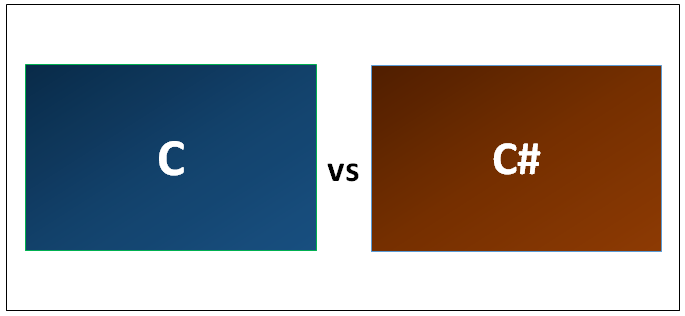Updated June 12, 2023
Difference Between C and C#
C is called a high level, compiler language. The plan of high-level computer language is to deliver an easy and natural way of giving a program of commands to a computer. C# is derived from C programming language, alike to Java, C# is object-oriented, comes with a wide class library, and chains exception handling, multiple types of polymorphism, and separation of interfaces from implementations. The language is proposed for use in developing software components appropriate for deployment in distributed environments.
What is C?
As far as C is concerned, C was firstly developed by Dennis Ritchie between 1969 and 1973. It was primarily developed as a system programming language to write an operating system. The language of the raw computer is a stream of numbers which termed as machine code. therefore the job of an HLL is to offer a new collection of black box instructions, which can be given to the computer without us needing to see what happens inside them and it is the job of a compiler to fill in the details of these “black boxes”
The key features of C language are:
- low-level access to memory
- a simple set of keywords
- clean style
All the above characteristics make C language appropriate for system programmings like an operating system or compiler development. Even later on languages rented syntax/features in a straight line or indirectly from C language. Like the syntax of Java, PHP, JavaScript, and many other languages are mainly based on C language.
What is C sharp?
The C# language is deliberate to be a straightforward, modern, general-purpose, object-oriented programming language. Testing frameworks like NUnit11 make C# agreeable to test-driven development, so a good language for use with Extreme Programming. C# features with powerful development tools, multi-platform support, and generics, formulate C# a superior choice for many types of software development projects as below.
- Rapid application development projects
- Projects implemented by individuals
- Large or small teams, Internet applications
- projects with strict dependability requirements.
Also, Its sturdy typing helps to put off many programming errors that are frequent in weakly typed languages.
The design goals for C#, as listed by the ECMA standard:
- The C# language is deliberate to be a straightforward, modern, general-purpose, object-oriented programming language.
- The language and implementations thereof should provide support to software engineering principles such as
- Strong type checking
- Array bounds checking
- Detection of attempts to use uninitialized variables
- Automatic garbage collection.
- Software robustness
- durability
- programmer productivity is important.
- Source code portability is very important, as is programmer portability, especially for those programmers already familiar with C and C++.
- Support for internationalization is provided.
- C# is deliberate to be appropriate to write applications for hosted and embedded systems, ranging from the very large that use the complicated OS, down to the very small having dedicated functions.
- Although C# applications are economical with stare at to memory and the processing power necessity, the language cannot contend directly with performance and size with C or assembly language.
Head To Head Comparison Between C and C# (Infographics)
Below is the top 6 difference between C vs C#
Key Differences Between C and C#
Both are popular choices in the market; let us discuss some of the major differences:
Since C# is based, Syntaxes tend to be moreover similar. brackets used for segment coding structures, and C-style object-oriented code that includes dependencies and libraries are very similar. Moving from C# to C++ is likely more difficult because it’s a much more low-level language. C# handles much of the overhead that must be measured in a C++ program. This is one major reason C++ is considered a more difficult language too.
- Object-oriented setup: Even though the syntax differs to a considerable extent, the major concepts like classes, inheritance, and polymorphism remain the same.
- Compiled languages: dissimilar to Java an interpreted language, both C vs C# are compiled languages. This means before an application is launched on a PC or the server, the code must be converted to binaries and then executed. An executable EXE file is a good example of a compiled file that could be written in C++ or C#.
Further difference:
- C# is managed by the .NET CLR whereas C is unmanaged code.
- C can be executed in cross-platform environments. While C# expects the .NET Framework in order to execute.
- C# is more on the designs.C is more on functions
- C# Garbage collection is done by CLR, while C don’t hold the concept of garbage collection.
- C supports pointers but C# does not.
C vs C# Comparison Table
|
C |
C# |
| C program suits Hardware apps, system programming, chip designing, and embedded devices. | Majorly suitable for application and web apps development. |
| Major data types involved: int, float, double and char. | Major data types involved: int, float, double and char, Boolean. which is used to handle logical operations. |
| Total number of keywords used in C programming: 32 | Total number of keywords used in C# programming: 87 |
| There is only one integral type available in C | C# involves 2 integral types in it. |
| A structured programming language. | An object-oriented programming language. |
| Execution flow involves top-down mannerism. | C# follows a bottom-up program structure for execution. |
Recommended Article
This has been a guide to the top differences between C vs C#. Here we also discuss the key differences with infographics and comparison table. You may also have a look at the following C vs C# articles to learn more –




